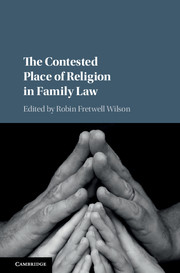Book contents
- The Contested Place of Religion in Family Law
- The Contested Place of Religion in Family Law
- Copyright page
- Dedication
- Contents
- Notes on Contributors
- Foreword
- Acknowledgements
- Introduction
- Part I The Foundations and Boundaries of Religious Liberty
- Part II Religious Claims at Birth
- Part III Religious Claims in Childrearing
- 8 The Easiest Accommodation
- 9 Marriage Agreements and Religious Family Life
- 10 Religious Parents Who Divorce
- 11 Regulating the Relationship Between Parents
- 12 Bad Faith
- 13 By Faith Alone
- Part IV Rethinking Marriage After Obergefell
- Part V Religious Claims at the End of Life
- Part VI Shaping the Legal Culture of the Family
- Part VII International Perspectives
- Book part
- Statute Index
- Case Index
- Subject Index
13 - By Faith Alone
When Religious Beliefs and Child Welfare Collide
from Part III - Religious Claims in Childrearing
Published online by Cambridge University Press: 11 May 2018
- The Contested Place of Religion in Family Law
- The Contested Place of Religion in Family Law
- Copyright page
- Dedication
- Contents
- Notes on Contributors
- Foreword
- Acknowledgements
- Introduction
- Part I The Foundations and Boundaries of Religious Liberty
- Part II Religious Claims at Birth
- Part III Religious Claims in Childrearing
- 8 The Easiest Accommodation
- 9 Marriage Agreements and Religious Family Life
- 10 Religious Parents Who Divorce
- 11 Regulating the Relationship Between Parents
- 12 Bad Faith
- 13 By Faith Alone
- Part IV Rethinking Marriage After Obergefell
- Part V Religious Claims at the End of Life
- Part VI Shaping the Legal Culture of the Family
- Part VII International Perspectives
- Book part
- Statute Index
- Case Index
- Subject Index
Summary
- Type
- Chapter
- Information
- The Contested Place of Religion in Family Law , pp. 308 - 346Publisher: Cambridge University PressPrint publication year: 2018
- 1
- Cited by

